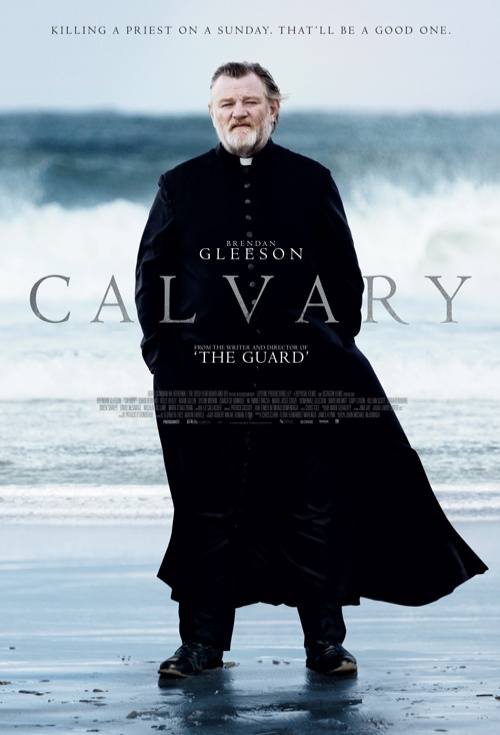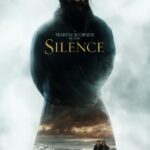Killing A Priest On A Sunday. That’ll Be A Good One
Director
John Michael McDonagh
Starring
Brendan Gleeson
Kelly Reilly
For those that don’t know, Calvary (or Golgotha) is the place outside Jerusalem where Jesus was crucified; which, considering the poster and the story, is quite apt. Set in a small parish in Sligo (West Ireland), Father James Lavelle [Gleeson] sits in his confessional and listens to one of his congregation detail the years of abuse he suffered as a child. Furthermore, the abuser is now deceased, so he cannot reap revenge. The unknown parishioner then states that killing an evil priest is nothing special, what would be truly impressive is to kill a good priest; a man beloved by many who has done nothing wrong. The confessor then explains he will give Father Lavelle a week ‘to get his house in order’ before he will kill him down by the sea. Father Lavelle takes this news surprisingly well (no doubt as a matter of shock and disbelief) and sets about visiting people in his parish throughout the week before meeting his would-be assassin by the shore.
One of the many (MANY) things I love about this movie is that it’s not a detective film, it’s established very early on that Father Lavelle knows exactly who made the confession and simply goes about his business, examining the cruelty and maliciousness of his fellow man. What’s more, it’s evident that John Michael McDonagh has set out to tell the other side of the story. Films and TV have been milking stories about or involving abusive or corrupt priests but this is the story of a genuinely good man who simply happens to be a priest. As such, this film is littered with symbolism and Christian parallels, tonally dealing with injustice, the futility of vengeance, sacrifice and forgiveness. While this works beautifully for 90% of the running time, there is a strangely heightened sense of unrealism, reflecting that of a parable; specifically when it comes to the disjointedly savage interactions between the broadly eccentric characters. For such a small town, it’s filled with very outspoken remorseless individuals: the promiscuous wife, the antagonistic pub landlord, the weak fellow priest, the cynical surgeon, the garda with a penchant for male prostitutes, the suicidal ageing novelist, the list spools on with only the priest as a truly altruistic man. For some this will be welcomed for its slightly surreal tones, for others it will make the film feel dishonest and far-fetched.
In addition to the characters, the locations play an equally important role. My family are from Sligo and it’s almost unheard of to see it represented in film – outside of a few random shots of Benbulbin. Both the interiors and exteriors (bar those that I think were shot in County Dublin) give a humbling sweeping sense of scale and isolation. The sea is always tempestuous, the mountains roll off the fields, the houses are few and far between and the cloud hang heavy on the horizon. All of this gives the wonderful sense of dread and ominous foreboding that the narrative requires. Calvary also continues a contemporary running tradition of utilising bands rather than conventional composers to generate the musical score, in this case the talents of Calexico have been employed. A keen choice, in my opinion, for their occasional use of lilting strings and desert rock vibe. On top of that, there are the performances, which are extremely good. As stated, the characters are somewhat elevated for absurdity but each one is a distinct personality who weaves in and out of Father Lavelle’s life, taunting him in their own respective way. One of the reasons these performances feel so disarmingly true (to my mind) is the utilisation of comedic actors. Throughout cinematic history it is self-evident that some of the finest dramatic performances are delivered by individuals synonymous with comedy, largely due to the inherent psychological damage within someone who finds comfort/solace in being funny.
This film clearly isn’t for everyone, with its bleak, sometimes nihilistic approach and cynical representation of community life. But it’s my belief that Calvary is so much more than that, a genuinely mature powerful analysis that, while amusing and disturbing at times, proves itself a significant release of equal noteworthiness and importance to that of In Bruges (penned and shot by John’s brother Martin). To my mind, this is quite easily the greatest film produced by the Irish Film Board and one of the best shot in Ireland.
Release Date:
11th April 2014
The Scene To Look Out For:
Like a play, there are so many standout interactions and moments but one of the ones that really struck a resonance with me came around two thirds into the film. Father Lavelle is strolling through the countryside when he notices a young girl walking in the road. He makes casual conversation with her, asking if she’s on her holidays, where she’s from – the usual conversational interaction you get from a child – only to have the girl’s father come hurtling down the road in his car and forcefully shoving his daughter into the backseat. The father, furious and suspicious of the priest’s motivations and specifically what may have been said, issues a warning and drives off. The abruptness and severity of the interaction leaves the priest overcome with emotion, emitting fear, confusion, shock but most of all he’s just hurt by the implication. It’s a really good representation of an innocent individual who belongs to a demonised group (whether ethnically, vocationally or otherwise).
Notable Characters:
Without a doubt, the two biggest surprises are Chris O’Dowd and Dylan Moran. Two men famed for their hilarious performances in Graham Linehan sitcoms. Deeply fascinating and curious personalities performed completely against type with the most astounding results. To say anything about these character’s lives, actions or motivations would probably ruin a lot of the story, so I’ll neatly sidestep that but anyone who’s seen the film will agree their respective contributions were brilliant.
Highlighted Quote:
“Why in the fuck would you tell me a story like that?”
In A Few Words:
“Put simply, this movie is a treasure”
Total Score: 5/5

![The Red Right Hand Movie Reviews [Matthew Stogdon]](https://reviews.theredrighthand.co.uk/wp-content/uploads/2021/12/cropped-header1.png)



